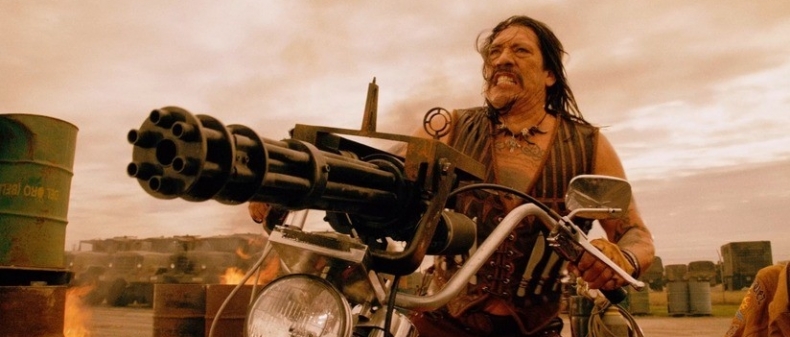
A glut of neo-grindhouse films have come to the public in the past six years, even excluding the works of Robert Rodriguez and Quentin Tarantino. Black Dynamite spoofed the most obvious characteristics of blaxploitation films, the RZA paid homage to kung fu films with The Man with the Iron Fist, while Hobo with a Shotgun felt like the nightmare that one of John Carpenter’s characters might have. And that’s without discussing unfortunate VOD menu fillers like Hell Ride and Iron Sky.
Despite the cottage industry that these movies have taken part in, the film that inspired them all was a notorious failure. In 2007, Quentin Tarantino and Robert Rodriguez made Grindhouse, a three-hour omnibus film that proved mainstream audiences don’t like the same things as people on Ain’t It Cool News message boards. Despite two high profile directors and glowing reviews, the movie bombed because, well, most young people don’t know the definition of “grindhouse” (the type of cheap run-down movie theatre one might attend in the 60s and 70s to watch ignominious releases of action, horror, and kung fu films).
Yet the neo-genre persists six years later, albeit with lower budgets and shorter run-times. All of the conflicts and problems with neo-grindhouse aesthetic are present in that first movie. Tarantino used the high concept log-lines and low-budget techniques of exploitation movies as a source of inspiration for Death Proof, his own dialogue-heavy portion of the film. In contrast, Rodriguez’ half, Planet Terror, disguises itself as an homage but condescendingly treats the older films as if their only charm comes from their incompetence.
It’s a trait of Rodriguez’ filmmaking that’s only grown worse in intervening few years. While Tarantino moved on from this type of filmmaking to create slightly classier works of art (the somewhat classier Inglourious Basterds and not-that-much-classier Django Unchained), Rodriguez continued to work in the neo-grindhouse mold, at first giving us Machete, based on a fake trailer made for Grindhouse, and now its sequel, Machete Kills.
If this franchise has proved anything, it’s that mocking grindhouse films makes for an exceptionally tedious two hours. In both films, Rodriguez keeps moving Machete (Danny Trejo) from narrative twist to narrative twist, each one more bizarre and nonsensical than the last, until the movie no longer bears any resemblance to the genre it’s supposed to be celebrating.
If nothing else, Machete Kills abandons the pretense of homage that defined the first entry of the franchise. Rodriguez leaves the straight-face behind and delivers a full-on parody of the genre. He may as well have titled it Exploitation Movie. Although, when Jason Friedberg and Aaron Seltzer turn in one of their half-assed spoofs, it’s usually an attempt to cash in on contemporary pop culture zeitgeist (their latest being The Starving Games, get it?), as opposed to a form of filmmaking that no longer exists.
In this film, Machete, the ex-federale-cum-American-agent-cum-all-around-badass, encounters not only Mexican revolutionaries, brothels, and sexy double agents, but also a lasers, hovercrafts, and a Moonraker-esque plot to repopulate humanity on a space station. Combined with this smorgasbord of random pop culture references, the cast of Machete Kills includes a number of washed up celebrities. In Machete, he gave us Lindsay Lohan (dressed as a nun) and Stephen Seagal. Here, we get Charlie Sheen (credited as Carlos Estevez) as a foul-mouthed President of the United States and Mel Gibson as a megalomaniac industrialist.
I’m not against Mel Gibson’s right to make movies, but why is he in this movie? Because he’s an anti-Semite who beat his wife. That’s it. That’s the joke. Why does Gibson’s character claim to be a Star Wars fan before shuttling Machete around in a replica of Luke Skywalker’s Tatooine hovercraft? Because it’s a reference and references are supposed to be funny.
Rodriguez’ early films, particularly Desperado, were simple and effective, indebted to their grindhouse inspirations but not chained to them. There’s something noxious about seeing Rodriguez fall to this level, a sense of desperation that becomes more and more potent in every new Rodriguez production, as if he’s terrified that we might stop paying attention. The cast of this film could make up a season of The Surreal Life, and Machete Kills serves much the same purpose as that TV show. It offers audiences a chance to laugh at cultural products of the past while existing as one of the most execrable cultural products of the present.
____
Alan Jones writes about film for Toronto Standard. You can follow him on Twitter at @alanjonesxxxv.
For more, follow us on Twitter @TorontoStandard and subscribe to our newsletter.














